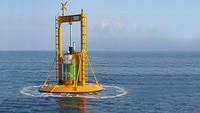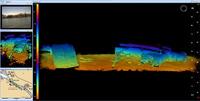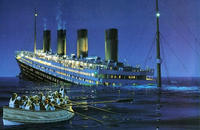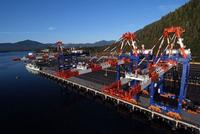-
As maritime security rises, pirate attacks are down
In the past four years Somali pirates have attacked 800 ships and taken 3,400 people hostage. Now shipping companies which regularly go through the Indian Ocean are fighting back by hiring private security, and the scales have tipped
-
-
DHS submersible Pluto mimics the real narco-subs
In the early 1990s, South American drug cartels came up with a new tactic to transport narcotics destined for the United States: small, radar-dodging, self-propelled, semi-submersibles (SPSSs); better to address the submersible problem, DHS Science and Technology Directorate created its own submersible and called it Pluto, after the planet which is difficult to spot
-
-
Canada funds digital technology to enhance maritime security, surveillance
New funding will allow exactEarth to improve its ability to locate more than 80,000 ships daily anywhere around the world and transmit this information quickly to its customers; this data is used within Canada and globally for a number of purposes, including enhancing maritime security and surveillance as well as search and rescue support
-
-
DHS funds more tests of autonomous power buoy for ocean surveillance

Ocean Power Technologies (OPT) has entered into an agreement with DHS Science & Technology Directorate to perform a new round of in-ocean tests on the company’s Autonomous PowerBuoy to demonstrate its use for ocean surveillance
-
-
Long Beach Police Department purchases underwater inspection system for port

The Port of Long Beach is the second busiest seaport in the United States and is a major gateway for trade with Asia, handling more than six million containers annually; to enhance port security, the City of Long Beach Police Department has purchased an Underwater Inspection System (UIS) from Cod Octopus
-
-
Men in maritime disasters save themselves first --“women and children first” is a myth

Since the sinking of the Titanic, there has been a widespread belief that the social norm of “women and children first” gives women a survival advantage over men in maritime disasters, and that captains and crew members give priority to passengers; a new study find that the Titanic disaster, in which 70 percent of the women and children on board were saved compared to 20 percent of the men, is a glaring exception to the rule; during maritime disasters, men use their relative strength to save themselves; what is more, studies of human behavior during natural disasters show the same results: in life-and-death situations, it is every man for himself
-
-
U.S. agency critical of Canadian ports' security

The U.S. Federal Maritime Commission has issued a report criticizing Canadian sea ports for lax security. The commission reports singled out Prince Rupert port in British Columbia as an especially egregious case of insufficient security for U.S.-bound cargo
-
-
Northrop Grumman delivers Nationwide AIS to Coast Guard
Northrop Grumman has delivered its Nationwide Automatic Identification System (AIS) to the Coast Guard; the system provides a more comprehensive view of vessels bound for and navigating within U.S. ports and waterways
-
-
ONR sensor and software suite tracks, hunts down more than 600 suspect boats
A new sensor and software suite sponsored by the Office of Naval Research recently returned from West Africa after helping partner nations track and identify target vessels of interest as part of an international maritime security operation
-
-
More effective radiation detection of cargo, baggage

A new technique for radiation detection that could make radiation detection in cargo and baggage more effective and less costly for homeland security inspectors; the novel detection method relies on spectral shape discrimination (SSD), taking advantage of a new class of nanoporous materials known as metal-organic frameworks (MOFs)
-
-
Exploring the Bermuda Triangle's swirling vortices

Researchers, funded by the Office of Naval Research, deployed twenty-one underwater probes to study vortices at the Bermuda Triangle; a vortex is a swirl of water that can be created in several ways, including water being pushed between land masses and then released into the open ocean; the oceanographers did well to lose only one of the underwater probes, considering they were studying the notorious Triangle
-
-
High-seas piracy? There will soon be an app for that
The U.S. Navy is sponsoring research aiming at developing Web applications to help multinational navies police the world’s oceans
-
-
CBP tests streamlined cargo security procedure
U.S. Customs & Border Protection’s (CBP) launched Simplified Entry Pilot, which allows participants to file a streamlined data set much earlier in the import process, thus providing more time to identify security threats
-
-
NY-NJ Port Authority centralizes security operations
The Port of Authority of New York and new Jersey has created a stand-alone Security Department and is now searching for a Chief Security Officer to oversee all security and safety functions, resources, and personnel
-
-
Lego pirate proves, survives, super rogue wave
Scientists have used a Lego pirate floating in a fish tank to demonstrate for the first time that so-called “super rogue waves” can come from nowhere in apparently calm seas and engulf ships
-
- All
- Regional
- Water
- Biometrics
- Borders/Immig
- Business
- Cybersecurity
- Detection
- Disasters
- Government
- Infrastructure
- International
- Public health
- Public Safety
- Communication interoperabillity
- Emergency services
- Emergency medical services
- Fire
- First response
- IEDs
- Law Enforcement
- Law Enforcement Technology
- Military technology
- Nonlethal weapons
- Nuclear weapons
- Personal protection equipment
- Police
- Notification /alert systems
- Situational awareness
- Weapons systems
- Sci-Tech
- Sector Reports
- Surveillance
- Transportation
Advertising & Marketing: advertise@newswirepubs.com
Editorial: editor@newswirepubs.com
General: info@newswirepubs.com
2010-2011 © News Wire Publications, LLC News Wire Publications, LLC
220 Old Country Road | Suite 200 | Mineola | New York | 11501
Permissions and Policies
Editorial: editor@newswirepubs.com
General: info@newswirepubs.com
2010-2011 © News Wire Publications, LLC News Wire Publications, LLC
220 Old Country Road | Suite 200 | Mineola | New York | 11501
Permissions and Policies
